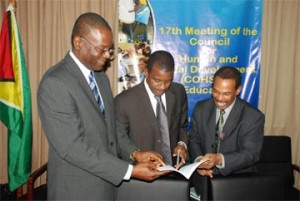The focus on making exams emanating out of Caribbean Council of Examinations (CXC) internationally competitive was one of the main themes at the 17th Council for Human and Social Development (COHSOD), which concluded yesterday.

Speaking at a press conference at the International Conference Centre, Dominica’s Minister of Education, Sport and Youth Affairs Vince Henderson said the most upstanding point from the meeting as regards making CXC more international is utilizing more technology in the system. Upgrading the level at which technology is used in the creation of syllabus and marking of papers among other issues were discussed at the meeting.
Henderson said means to make the actual content of the syllabus more international was being discussed also. Discrepancies in performances, challenges faced by youth and the role of science and technology are all to be examined.
‘An education for all’ programme is to be implemented with a focus on providing an opportunity for all students — including those who are physically challenged or disabled — to be fairly included in the school system.
Another issue which will be given preference after this COHSOD is the further development of Caribbean Vocational Qualifications (CVQ), which was introduced to facilitate greater movement of skilled persons within the Caribbean Single Market Economy (CSME). A CVQ skills-based certificate is a major accomplishment for the region especially for those trade persons whose skills are recognized. This facilitates their movement and employability within the Caribbean Single Market.
Member states will also aim to aspire in the advancement of Information and Communication Technologies (ICT), the development of language skills and science and technology, the strengthening of teacher training and the retention of trained teachers within the Caribbean. Special emphasis will also be placed on the on increasing the number of students at the tertiary level and to promote research and development.
Trinidad and Tobago has presented a document on how its educational system stands when compared with international systems, Dr Edward Greene, Caricom Assistant Secretary-General, Human and Social Development, told reporters.
He said the region has always placed emphasis on the comparing and evaluating among member states and it is commendable that Trinidad has taken the initiative to evaluate itself internationally. It is an approach that hopefully the entire region will adopt, he said.
Meanwhile Henderson said that the Economic Partnership Agreement (EPA) will allow local education markets (with the exception of Guyana, which has signed a goods-only agreement) to be opened to European enterprises, thus providing similar services. He said that as of now the University of the West Indies (UWI) is putting itself in position to benefit from the EPA.
A study headed by Professor Barbara Bailey, University Director for the Centre of Social and Development Studies UWI, was another prominent article on COHSOD’s agenda.
The study looked at male underperformance in schools. According to Professor Bailey, the findings so far disprove the popular perception that girls are brighter that boys, or naturally perform better academically.
The study was conducted in four countries, covering 39 schools and among 1,500 students. It looked at the performance patterns for both males and females and has concluded that sex in itself is not the determining factor in good academic performance but a lot of other factors are responsible.
Three main factors that determined academic performance, according to the study, were the type of school that was attended before secondary school, that is, whether private or public; the type of schools they are currently attending and the children’s ethnicity.
Another interesting fact that evolved from study is that both males and females from same sex schools did better that those from coed schools. Professor Bailey said this finding in particular is surprising since it was the accepted fact that boys would normally perform better in coed schools as opposed to same sex. She said that it was always thought that mixing the sexes would result in better male performance since girls normally temper boys’ behaviour.
The Caricom Secretariat also launched a new publication ‘Guidelines for Developing Policy, Regulation and Standards in Early Childhood Development Services’. The publication which is the first of its kind contains guidelines which seek to standardise early childhood development services in all communities. The publication was specifically published to address challenges in dealing with early childhood issues in the Caribbean and to improve the quality of education for all children especially the disadvantaged.


